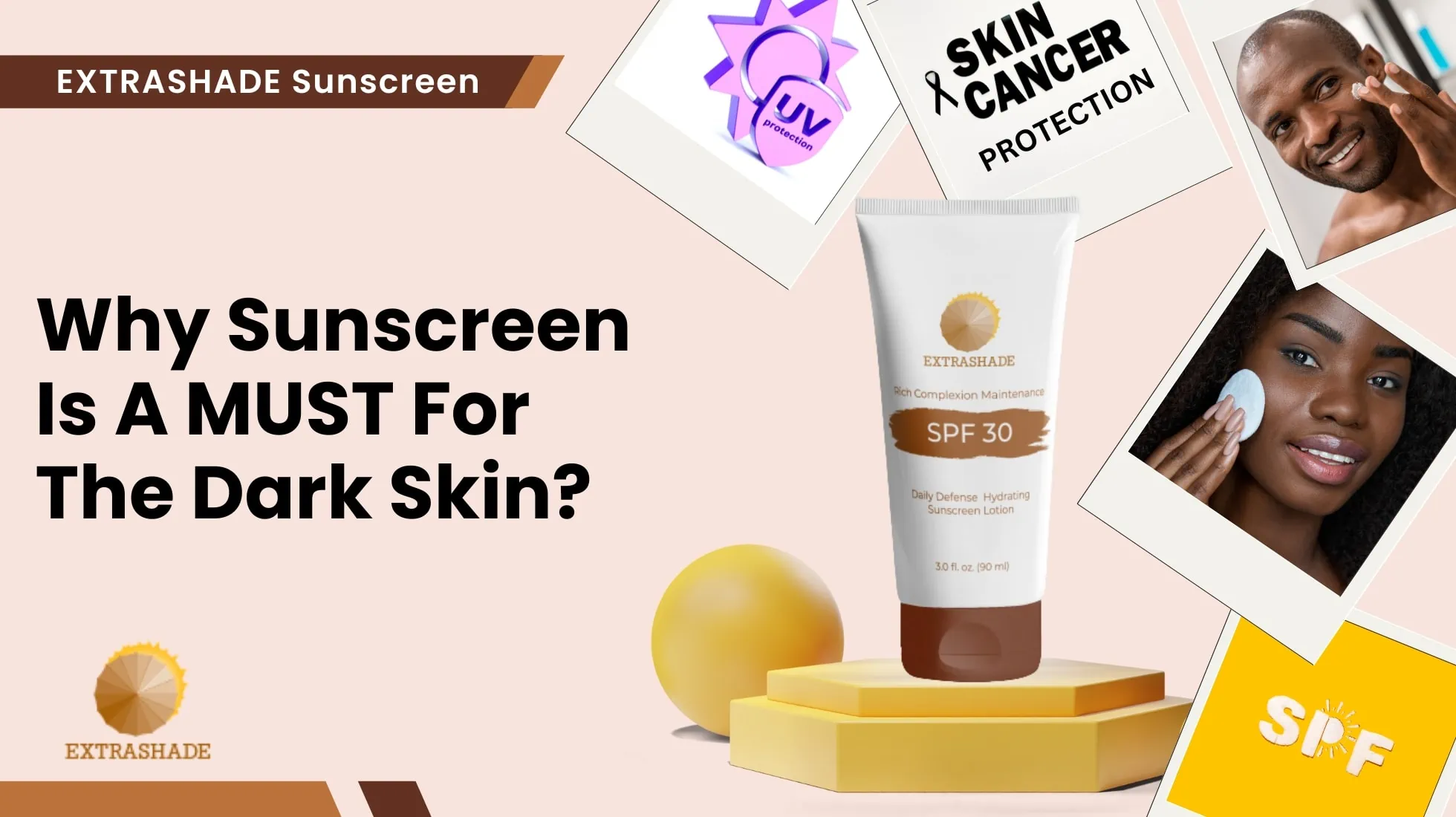As the sun rises high in the sky, many people bask in its warm glow, lathering on sunscreen to protect their skin from harmful UV rays. However, there is a common misconception that those with darker skin tones are immune to the damaging effects of the sun.
This couldn’t be further from the truth. In fact, dark-skinned individuals are just as susceptible to sunburn, premature aging, and even skin cancer as their lighter-skinned counterparts.
This article aims to debunk this myth and shed light on why sunscreen is an absolute necessity for everyone, regardless of their skin color.
Importance of Sunscreen for Dark Skin
Sunscreen is important for individuals with dark skin for several reasons, and it is a common misconception that people with darker skin tones are not at risk of sun damage. Here are some key reasons why sunscreen is essential for individuals with dark skin.
i. Protection against UV radiation
Dark skin contains more melanin, which provides some natural protection against the harmful effects of ultraviolet (UV) radiation. However, it does not offer complete protection, and dark-skinned individuals can still suffer from sunburn, premature aging, and an increased risk of skin cancer if not adequately protected.
ii. Prevention of hyperpigmentation
Dark skin is more prone to developing hyperpigmentation, such as dark spots and uneven skin tone, when exposed to the sun. Sunscreen helps prevent these skin issues by blocking the harmful UV rays that can trigger the overproduction of melanin.
iii. Reduction of skin cancer risk
While individuals with darker skin have a lower overall risk of developing skin cancer compared to those with lighter skin, they are still susceptible to certain types of skin cancer, including melanoma. Regular use of sunscreen can significantly reduce the risk of skin cancer.
iv. Prevention of premature aging
Sun exposure is a major factor in premature aging of the skin, leading to wrinkles, fine lines, and loss of skin elasticity. Sunscreen helps protect the skin from the damaging effects of UV rays, preserving a more youthful and healthy appearance.
v. Protection against sun-induced health issues
Prolonged exposure to the sun without protection can lead to various health issues, including heat-related illnesses and eye damage. Sunscreen helps mitigate these risks by providing a barrier against harmful UV radiation.
vi. Even skin tone and texture
Sunscreen helps maintain a more even skin tone and texture by preventing sun-induced damage. It contributes to a smoother and healthier complexion.
vii. Year-round sun protection
UV rays are present year-round, even on cloudy days. It’s essential to incorporate sunscreen into your daily skincare routine, regardless of the weather, to ensure continuous protection.
viii. Prevention of sunburn
Even though individuals with dark skin are less likely to experience severe sunburns, it can still occur. Sunscreen helps prevent sunburn, which is not only uncomfortable but also damages the skin.
Choosing the Right Sunscreen for Dark Skin
Choosing the right sunscreen for dark skin is important for protecting against the harmful effects of the sun, including sunburn, premature aging, and the risk of skin cancer. While individuals with darker skin tones have more melanin, which provides some natural protection against UV rays, it’s still essential to use sunscreen. Here are some tips for selecting the right sunscreen for dark skin.
Broad spectrum protection
Choose a sunscreen that offers broad-spectrum protection, meaning it protects against both UVA and UVB rays. UVA rays can cause premature aging, while UVB rays are responsible for sunburn.
SPF level
Select a sunscreen with a Sun Protection Factor (SPF) of at least 30. Higher SPFs offer more protection, but there is diminishing returns beyond SPF 30. SPF 30 blocks about 97% of UVB rays, while SPF 50 blocks about 98%.
Physical or mineral sunscreen
Consider using a physical (mineral) sunscreen that contains zinc oxide or titanium dioxide. These ingredients create a physical barrier on the skin and are less likely to leave a white cast on darker skin.
Avoid oxybenzone
Some individuals may be sensitive to chemical filters like oxybenzone, which is found in some sunscreens. Consider choosing a sunscreen without oxybenzone if you have sensitive skin.
Non-comedogenic
Look for a sunscreen that is labeled as non-comedogenic if you have acne-prone skin. This means it won’t clog pores, reducing the risk of breakouts.
Water resistance
If you’ll be swimming or sweating, choose a water-resistant sunscreen to ensure better protection. Remember to reapply after swimming or vigorous activities.
No fragrance
Fragrance-free sunscreens are a good option, especially for individuals with sensitive skin, as fragrances may cause irritation.
Test before full use
Before applying a new sunscreen all over, it’s a good idea to do a patch test to ensure you don’t have an adverse reaction.
Daily use
Sunscreen should be a part of your daily skincare routine, even on cloudy days. UV rays can penetrate clouds and cause skin damage.
Reapply regularly
Reapply sunscreen every two hours, or more frequently if you’re sweating heavily or swimming. Even if a sunscreen claims to be “all-day” or “water-resistant,” it’s still essential to reapply.
Daily sun Protection Routine
Protecting your skin from the sun’s harmful ultraviolet (UV) rays is crucial for maintaining healthy skin and preventing premature aging, wrinkles, and skin cancer. Incorporating a daily sun protection routine is essential to shielding your skin from the sun’s damaging effects.
Morning routine
- Cleanse and moisturize: Start your day by cleansing and moisturizing your face to prepare it for sunscreen application. Choose a gentle cleanser that suits your skin type and a lightweight moisturizer that won’t interfere with sunscreen absorption.
- Apply sunscreen: Generously apply a broad-spectrum sunscreen with an SPF of 30 or higher to all exposed skin, including your face, neck, ears, and hands. Don’t forget to apply sunscreen to your lips, using a lip balm with SPF.
- Seek shade: Whenever possible, seek shade during the sun’s strongest hours, typically between 10 am and 4 pm. This will help reduce your overall UV exposure.
Throughout the Day:
- Reapply sunscreen: Reapply sunscreen every two hours, or more often if you’re sweating or swimming. Remember to reapply sunscreen even if it’s cloudy outside, as UV rays can still penetrate clouds.
- Protect your eyes: Wear sunglasses that block UVA and UVB rays to protect your eyes from sun damage.
- Cover Up: Wear protective clothing, such as a wide-brimmed hat, long-sleeved shirt, and pants, to further shield your skin from the sun.
- Stay hydrated: Drink plenty of water throughout the day to keep your skin hydrated and healthy.
Additional Tips:
- Choose the right sunscreen: Select a broad-spectrum sunscreen, meaning it protects against both UVA and UVB rays. Opt for a water-resistant formula if you plan to be in or near water.
- Check the expiration date: Ensure your sunscreen is not expired, as its effectiveness may diminish over time.
- Be patient: Sun-damaged skin can take time to heal. Be patient with your skin and continue to use sunscreen and other protective measures consistently.
- Consult a dermatologist: If you have any concerns about sun damage or skin cancer, consult a dermatologist for personalized advice and treatment options.
Conclusion
The importance of sunscreen for dark skin cannot be overstated. Despite the misconception that dark skin is not susceptible to sun damage, it is crucial for individuals with darker skin tones to protect themselves from harmful UV rays. Sunscreen helps prevent skin cancer, premature aging, and sunburn in people of all skin types.
By incorporating sunscreen into their daily skincare routine, individuals with dark skin can maintain healthy and radiant skin while minimizing the risk of sun-related health issues. Therefore, it is imperative for everyone, regardless of their skin tone, to prioritize sunscreen application as a non-negotiable step in their daily skincare regimen.


